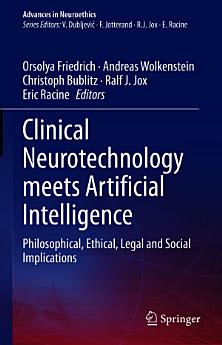Clinical Neurotechnology meets Artificial Intelligence: Philosophical, Ethical, Legal and Social Implications
About this ebook
This volume brings together scholars from a wide range of academic disciplines such as philosophy, law, the social sciences and neurosciences, and is unique in terms of both its focus and its methods. The latter vary considerably, and range from philosophical analysis and phenomenologically inspired descriptions to legal analysis and socio-empirical research. This diversified approach allows the book to explore the entire spectrum of philosophical, normative, legal and empirical dimensions of intelligent neurotechnologies.
Philosophical and legal analyses of normative problems are complemented by a thorough empirical assessment of how BCIs and other forms of neurotechnology are being implemented, and what their measurable implications are. To take a closer look at specific neurotechnologies, a number of applications are addressed. Case studies, previously unidentified issues, and normative insights on these cases complement the rich portrait this volume provides.Clinicians, philosophers, lawyers, social scientists and engineers will greatly benefit from the collection of articles compiled in this book, which will likely become a standard reference work on the philosophy of intelligent neurotechnologies.
About the author
Prof. Friedrich is philosopher and physician by training and has worked intensively in the field of philosophy of medicine, neuroethics and philosophy of technology. Her latest work covers the conceptual and ethical implications of BCI use and of novel human-machine-interactions.
Wolkenstein has studied philosophy, history and theology and works on philosophical and ethical aspects of neurotechnologies. He also uses political philosophy to think about how all sorts of emerging technology can be governed. His latest articles cover the ethics of algorithms, the ethics of self-driving cars and legal responsibility as well as personhood in BCIs.
Dr. Bublitz is a legal scholar working on various philosophical and legal aspects of neurotechnologies, AI and psychology. His latest work includes articles on legal responsibility and BCIS, political implications of moral enhancement, and a human right to mental liberty. He co-edits the Palgrave Studies in Law, Neuroscienceand Human Behavior.Prof. Jox is a trained physician and philosopher, specializing in bioethics. He has extensive experience with a whole range of neuroethical questions. His latest work includes the examination of various aspects of brain-computer interfaces (autonomy, agency, algorithms) as well as work on the professionalization of the field of neuroethics itself. He has edited several books and special issues. Also, he is co-editor of the Springer series “Advances in Neuroethics”, together with E. Racine and others.
Prof. Racine is a bioethicist who has made recognized contributions to the development of neuroethics and pragmatic ethics. Inspired by philosophical pragmatism, his research aims to bring to the forefront the lived experience of ethically problematic situations by patients and stakeholders and then to resolve them collaboratively through deliberative and evidenced-informed processes. His latest includes, among other things, surveys about public and professional attitudes toward BCIs and investigations about the impact of BCI on agency and autonomy.






